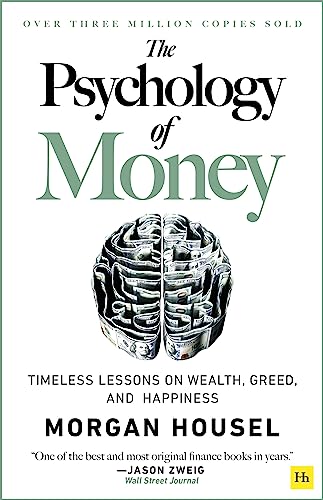The Psychology of Money: Timeless lessons on wealth, greed, and happiness
“The Psychology of Money,” penned by Morgan Housel, offers profound insights into the intricate web of behaviors, emotions, and psychology surrounding our financial decisions. Housel elucidates that mastering money isn’t just about understanding the economics but grasping the unpredictable and often irrational nature of human beings.
Key Takeaways:
- Diverse Financial Histories: Every individual has a unique financial story shaped by personal experiences, upbringing, and cultural context. These stories dictate our approach to money, savings, and investments, making it essential to recognize and reflect upon our financial roots to make informed decisions.
- The Role of Luck & Risk: While hard work and strategy are essential, the unpredictable elements of luck and unforeseen risks play a significant role in financial outcomes. Acknowledging this can lead to a more balanced and holistic approach to money management.
- The Perennial Lure of More: The incessant human desire to accumulate more can be detrimental. By identifying this innate tendency, individuals can learn to find contentment and satisfaction in what they have, thus ensuring emotional and financial stability.
- Pessimism’s Allure: Pessimism, often seen as a sign of intellectual depth, can cloud judgment. Recognizing that wealth often accumulates quietly and over long periods can help in maintaining a balanced and optimistic outlook on financial growth.
- Valuing Freedom Over Wealth: Wealth’s greatest gift is the freedom it provides, allowing individuals to pursue passions, spend time with loved ones, and live life on their terms. This perspective shift can lead to more purpose-driven financial goals.
Applying Its Wisdom:
1. Analyze Past Experiences: Reflecting on early financial lessons can provide clarity on current financial behaviors and beliefs. By understanding these, one can reshape and refine their financial journey.
2. Cultivate Financial Empathy: Adopting an empathetic view towards others’ financial choices fosters understanding and reduces judgment, leading to richer, more informative conversations.
3. Prioritize Financial Independence: True wealth offers autonomy. By focusing on achieving financial independence, individuals can experience the genuine joys of freedom, choice, and flexibility.
4. Commit to Continuous Learning: The financial landscape is ever-changing. Staying updated, being curious, and understanding the behavioral aspects of finance can provide a competitive advantage.
5. Establish Purpose-Driven Goals: Financial endeavors should have clear, purposeful goals that go beyond mere accumulation. Whether it’s contributing to society or achieving personal milestones, purpose-driven goals provide direction and motivation.
Conclusion:
Navigating the complex world of finance often feels like walking through a labyrinth. Yet, Morgan Housel’s “The Psychology of Money” offers a compelling lens to view this maze not as a series of walls and turns, but rather as a mirror reflecting our deepest beliefs, biases, and behaviors. This isn’t a mere treatise on wealth management but a profound exploration of the human psyche’s interplay with financial decisions.
Many of us were brought up with specific narratives around money: tales of scarcity, lessons of abundance, or perhaps the belief that wealth correlates directly with effort. However, Housel beckons us to question these narratives, inviting a deeper introspection. He nudges us to understand that financial success doesn’t just hinge on the best investment strategies but also on recognizing the unpredictable elements of luck and unforeseen risks.
Perhaps the most striking revelation is the realization that our insatiable quest for more can be our undoing. In a world where success is often gauged by materialistic accumulations, it’s refreshing, even revolutionary, to be reminded that the true essence of wealth lies in the freedom and autonomy it offers. It’s about the ability to make choices that align with one’s values, passions, and aspirations.
The modern financial landscape is ever-shifting, but the underlying human emotions, desires, and fears remain surprisingly constant. “The Psychology of Money” doesn’t promise a golden ticket to immense wealth. Instead, it gifts readers with something far more valuable: the wisdom to understand oneself, the tools to navigate the financial world with insight, and the vision to see wealth not as an end in itself but as a means to craft a life of purpose, contentment, and genuine happiness.
As we turn the last page, we’re left with an invigorating sense of empowerment. We’re not just better equipped to manage our finances but also richer in our understanding of the intricate dance between money and the human spirit.
Embark on a Deeper Journey
If this article of The Psychology of Money: Timeless lessons on wealth, greed, and happiness has piqued your curiosity, then the true magic awaits in the pages of the full book. Dive deeper, uncover more treasures, and truly transform your understanding. For those hungry for more, the portal to this arcane knowledge is but a click away. Secure your copy below and let your grand adventure begin.








